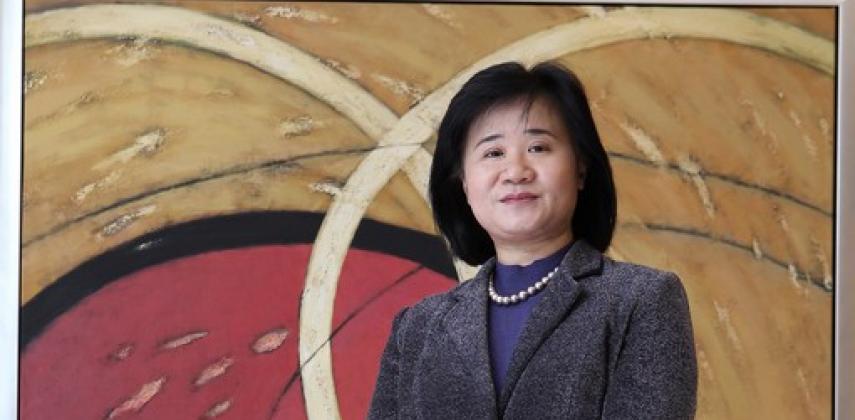The banking sector is traditionally a male-dominated field and that is especially true with mainland institutions. Nancy Chan Ha-fong is a trailblazer who has been setting standards and reaching new heights throughout her 30-year career with the mainland-linked Bank of Communications, which she joined as a management trainee three decades ago. Now, as deputy general manager, she is the bank's most senior woman executive, overseeing the operations of 43 branches across Hong Kong. Chan sees running a bank as akin to raising a family. Grooming young talent, she feels, is no different from bringing up children by giving them support, and watching them grow up and become independent. She shares her insights with Luisa Tam
Tell us about your career
I joined Bank of Communications as the first batch of management trainees in 1981. I was one of a handful of women in a group of 15 trainees. I chose this bank because it was the first which responded to my application. I was very impressed with the way they interviewed me. The whole interview was conducted in English. It was totally unexpected, especially in those days, plus this is a mainland bank. That experience was very special to me.
Our management training lasted six months, during which I worked in all sections of the bank to gain firsthand experience, which has proved to be highly valuable to me.
What does your day-to-day work involve?
My typical day is often packed with meetings, which usually take up half a day, and the rest of the time is spent on dealing with customers, managing people and problem solving. Retail banking revolves around people, which means interpersonal communication skills are the prerequisite.
What are the challenges you face at work?
Banking is a very exciting and challenging business. Every day, I am confronted with different issues – new businesses, new duties and market changes. There has not been a dull moment in my 30-year career. Every day is unpredictable.
The main challenge is how to deal with challenges on a regular basis. My approach is to first analyse, listen, discuss and then consult headquarters or get an outside perspective for advice. Only with sufficient data can I then make a decision. In banking, when we are faced with challenges, we cannot afford to stand still. We must make a decision and take the next step quickly with all the information we have got. Timing is very important; indecisiveness will cause even more problems. Every challenge or setback is a valuable lesson, and I will always review them so that I can do better next time.
What do you feel is the most rewarding part of your job?
Part of the job satisfaction comes from seeing my staff grow and improve in their performance. Even if they decide to leave the bank and go elsewhere, I will still be happy for them. It’s like watching your children grow up and become independent. I believe everyone has a choice to find what they want in life. In my case, I was the first batch of management trainees and the bank gave us plenty of resources and training. Not everyone has the same kind of luck. I learned a lot and was given plenty of opportunities throughout my career. And it’s my choice to stay with the bank for so long.
What kind of training does the bank provide for new recruits?
Today’s training focuses more on specific areas instead of offering everything in one go, like in the old days. We hope this will give them clearer directions and a good start to help them adapt to a new environment. And if they find there is a need to expand or upgrade their knowledge, we can continue to provide on-the-job training for them.
What are the reasons for this new approach in training newcomers?
We believe offering training in different streams and at different levels can provide better results than throwing everything at them from day one. Young people are quite impatient these days. They want to see immediate results, so we can’t put them on a six-month course. With this approach, we want them to come to us for more training when they find their skills and knowledge are inadequate.
What are the qualities of a successful leader?
We need to build strong teamwork in our business, and to achieve that we must act in a fair, just and open manner to gain trust and influence people. We cannot afford to have any hidden agenda that may ruin mutual trust.
Good leaders must have the vision to inspire others and the courage to realise that vision. The process is long and we must take it step by step to prove that our ideas work and convince others to buy in. Good leadership is all about working together with others. A strong leader should also be able to manage risk effectively.
What advice do you have for young people?
Everyone is special and different. We shouldn't measure everyone with the same yardstick. Young people should be given plenty of opportunities to seek out their path and future. But they must learn to shoulder the burden of life, and learning things the hard way is the best way to help them grow.
Young people must find their direction in order to find their path and place in the world. They must not be afraid to make mistakes and must always learn from mistakes because they are valuable tools for learning.
- Chan unwinds by hiking and swimming
- She also enjoys spending time with family and friends who are not in banking
- She likes eating at a fast-food outlet, sharing a table with others and observing them
- Chan believes it is important to be in control of your life


